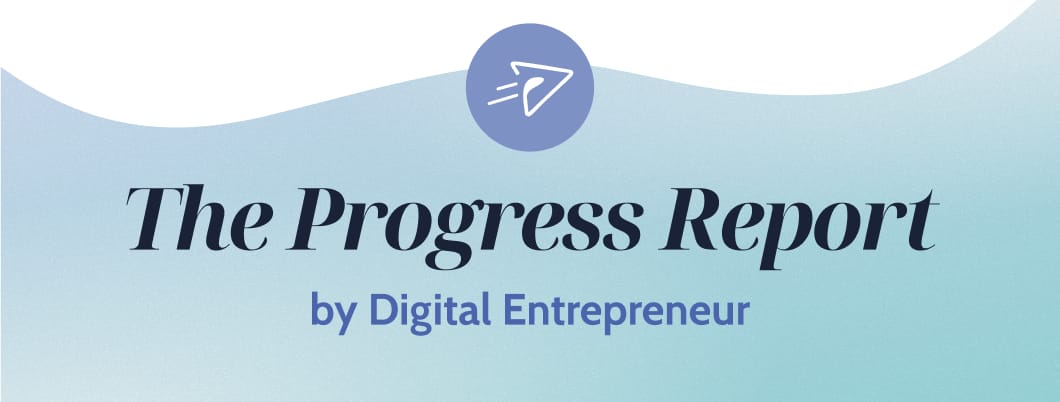
July 25, 2025
On Thursday, my Apple Watch buzzed with a reminder: “Time to breathe.”
I glanced down, annoyed.
I was in the middle of reviewing a proposal, had three emails marked urgent and was already running late for a call. Taking time “to breathe” felt like the least productive thing I could do.
But then I noticed something that made me super uncomfy.
My heart rate had been elevated for two hours straight, and I hadn’t moved from my desk.
I dug in, and saw that my sleep score had been declining for a week, too.
My watch was telling me what I refused to acknowledge: I was running myself into the ground.
Great. 🙃
Entrepreneurial burnout is, frankly, annoying.
It doesn't announce itself with a dramatic collapse. It creeps in slowly, wearing the mask of “dedication” and “hustle.”
By the time we recognize it, we're already deep in the hole, wondering why everything feels harder than it used to.
But burnout isn't inevitable. And you don't need a $300 watch to see it coming.
Burnout’s three early warning signs
How a HubSpot co-founder's perfectionism nearly derailed the company
One simple technique to reset your energy before you hit the wall
Sponsored
AI founders: Got a game-changing startup?
Building the future of AI? Here's your shot at $50K to make it happen.
The Next Big AIdea pitch competition is live. If you've got an AI startup that's changing how businesses grow, we want to see it.
Record a 60-second pitch and you could win $50,000 cash, $25K in AWS credits, 600K Clay credits + Pro Plan, and exposure to millions through HubSpot Media's network.
Five finalists get flown to San Francisco to pitch live at INBOUND 2025 in front of 1,000+ industry leaders.
Your AI idea deserves more than just another LinkedIn post.
Weekly Insight

In honor of our lovely sponsor, I wanted to tell a story about the one and only HubSpot. Or, rather, their co-founder and CTO, Dharmesh Shah.
Once upon a time, Shah was in the same position you are, and thought he was being a good founder.
As HubSpot started really growing, Shah found himself reviewing every line of code and approving every email campaign.
He'd stay until the office lights automatically shut off.
“I felt like I had to be involved in everything,” he recalls. “It was my responsibility as a founder.”
But Shah's version of responsibility was quietly destroying his company.
Three warning signs were flashing red, and he ignored them all.
Warning sign 1: Perception of perfection
Shah would spend hours tweaking minor features that were already good enough.
He'd review the same piece of code multiple times in a week. Not because it was broken. Because he couldn't let go of making it “just a little bit better.”
Features that should have shipped in days took weeks. His team started missing deadlines because everything had to be perfect.
If you have any experience in this world, you already know: things will never be perfect. You have to ship them anyway.
Warning sign 2: Loss of perspective
His daily to-do list kept growing, even as he worked ridiculously long hours.
Shah was accomplishing things, but somehow felt like he was falling further behind every day. The harder he worked, the more overwhelmed he felt.
Warning sign 3: Guilt-driven overwork
Shah felt guilty anytime he wasn't the first person in the office and the last to leave.
He'd check emails at midnight “just to stay on top of things.” Weekends were always work days. His team started matching his pace because they felt they had to.
The breaking point came when Shah caught himself reviewing a single snippet of code for the fourth time in two weeks.
Then it hit him: his perfectionism wasn't helping HubSpot. It was holding it back.
Shah instituted two rules that saved his sanity:
Email blackouts after 6 PM for the entire company.
One full afternoon per week blocked for “learning and rest” with zero work allowed.
And, boy howdy, it worked.
Shah regained his clarity, feeling more like himself again. His team's morale improved… AKA, they no longer hated working for him. The bottom line was happy, too. HubSpot's product development ended up accelerating because decisions got made faster.
The lesson isn't that you should care less about your business, or that you have to use the same burnout prevention methods Shah did.
It's that burning yourself out makes you worse at running it.
📚 Related Reading
Recognize when it's time to slow down by Audrey Rosyadi | How to build a “burnout safety net” using mental, emotional and physical recovery strategies.
How to stay balanced when you're on the brink of burnout by Ingrid Polini | Personal strategies for creating sustainable work-life balance without sacrificing ambition.
The productivity paradox by Simon Litt (that’s me! 👋) | Why successful entrepreneurs strategically do less.
Intent to Action
Recognizing burnout is one thing. Actually doing something about it is another.
Most advice tells you to “take a break” or “work less.”
It kinda pisses me off, tbh. When you’re doing something you really care about, this pithy, overly simplified advice doesn’t feel helpful… which is probably why I’ve burnt out so many times. 😅
Because of that, I’ve come up with a nice little system I call the 15-Minute Reset.
It's stupid simple, which is exactly why it works.
Here's how it works:
Every day, at the same time, you take 15 minutes to do absolutely nothing productive.
No emails. No “quick tasks.” No business podcasts or industry articles.
Just sit. Walk. Draw. Stare out the window. Try box breathing.
Let your brain do whatever it wants.
Why 15 minutes?
It's short enough that you won't feel guilty about “wasting time.”
It's long enough for your nervous system to actually downshift.
And it's consistent enough to become a habit without feeling like another item on your to-do list.
The magic happens in week 2.
Week 1, you'll feel antsy. Your brain will scream about all the “urgent” things you should be doing instead.
Week 2, something clicks. You start looking forward to those 15 minutes.
Week 3, you realize you're making better decisions during the other 23 hours and 45 minutes of your day.
Like I said… stupid simple.
I know it feels counterintuitive when you're drowning in work. But, if you're too busy to take 15 minutes for yourself, you're exactly the person who needs this most.
Your business needs you at your best, not at your most burned out.
Almost everything will work again if you unplug it for a few minutes. Including you.
Closing Thought
Burnout isn't a badge of honor. It's a waste of time.
The entrepreneurs who last aren't the ones who work the hardest. They're the ones who work the smartest, which means knowing when to step back and take a beat.
Dharmesh Shah didn't become successful despite taking time to reset. He became successful because he learned to protect and restore his energy.
Now, it’s your turn. ♟️
Next week, I’ll be continuing the theme of mindfulness with a piece on taming entrepreneurial anxiety.
See you then.


